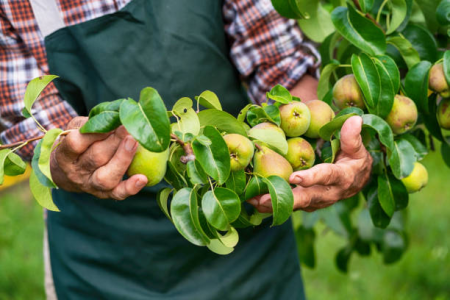Cut your grocery costs: Aussies save through alternative shopping methods
By
- Replies 20
In an era when the cost of living is a constant concern, Australians always look for ways to stretch their dollars further.
One method gaining traction is bypassing the traditional supermarket supply chain and buying directly from local farms.
This approach promises fresher produce but also significant savings for shoppers.
As an influx of imported tinned fruit and other produce arrived in Australia, a growing movement encouraged consumers to support local farmers instead.
This shift towards localism isn't just about patriotism; it's a practical response to the economic pressures consumers and producers face.
Jackson Bennett, who manages a pear farm in Victoria's Upper Beaconsfield, shared his observations of the changing market
‘It's a little bit disappointing considering fresh produce is still quite affordable, but we've noticed huge numbers and decreasing purchases at the checkout,’ he said.
‘You can still purchase a pear for less than 50 cents a piece, and a per kilo price on pears is still cheaper than dog food, yet we're struggling for people to buy fresh produce when it's quite affordable on a day-to-day level, which is odd.’
Initiatives like Box Divvy, co-founded by Jayne Travers-Drape, are bridging the gap. Box Divvy is a service that connects consumers directly with producers, offering savings compared to supermarket prices.
‘At Box Divvy, we are community-based and up to 30 per cent cheaper than supermarkets,’ she explained.
‘The produce comes in, we put it onto pallets, it goes out in the trucks and comes to you in your carport or garage the same day.’
Jayne also addressed a common misconception: fresh food is inherently more expensive. When sourced directly from the farm, it can be quite the opposite.
‘You're saving a huge amount; we always say to our members and our hubs, just go on a holiday because that's how much you're saving or pay the school fees; it is quite incredible,’ she said.
In related news, a group of families has successfully pooled their money for 50 years to buy fresh produce in bulk, saving hundreds of dollars compared to supermarket prices.
Food co-ops like this offer consumers greater bargaining power and provide better prices. Read more about their story here.
 Have you tried buying directly from farms, and what has your experience been? Do you have any tips for others looking to make the switch? Share your stories and insights in the comment below.
Have you tried buying directly from farms, and what has your experience been? Do you have any tips for others looking to make the switch? Share your stories and insights in the comment below.
One method gaining traction is bypassing the traditional supermarket supply chain and buying directly from local farms.
This approach promises fresher produce but also significant savings for shoppers.
As an influx of imported tinned fruit and other produce arrived in Australia, a growing movement encouraged consumers to support local farmers instead.
This shift towards localism isn't just about patriotism; it's a practical response to the economic pressures consumers and producers face.
Jackson Bennett, who manages a pear farm in Victoria's Upper Beaconsfield, shared his observations of the changing market
‘It's a little bit disappointing considering fresh produce is still quite affordable, but we've noticed huge numbers and decreasing purchases at the checkout,’ he said.
‘You can still purchase a pear for less than 50 cents a piece, and a per kilo price on pears is still cheaper than dog food, yet we're struggling for people to buy fresh produce when it's quite affordable on a day-to-day level, which is odd.’
Initiatives like Box Divvy, co-founded by Jayne Travers-Drape, are bridging the gap. Box Divvy is a service that connects consumers directly with producers, offering savings compared to supermarket prices.
‘At Box Divvy, we are community-based and up to 30 per cent cheaper than supermarkets,’ she explained.
‘The produce comes in, we put it onto pallets, it goes out in the trucks and comes to you in your carport or garage the same day.’
Jayne also addressed a common misconception: fresh food is inherently more expensive. When sourced directly from the farm, it can be quite the opposite.
‘You're saving a huge amount; we always say to our members and our hubs, just go on a holiday because that's how much you're saving or pay the school fees; it is quite incredible,’ she said.
In related news, a group of families has successfully pooled their money for 50 years to buy fresh produce in bulk, saving hundreds of dollars compared to supermarket prices.
Food co-ops like this offer consumers greater bargaining power and provide better prices. Read more about their story here.
Key Takeaways
- Australians were being urged to buy directly from local farms as an alternative to imports.
- Shopping directly can save consumers money while supporting local farmers facing declining sales.
- Jackson Bennett, a pear farm manager, highlighted the affordability of fresh produce like pears despite low consumer uptake.
- Jayne Travers-Drape from Box Divvy emphasises the substantial savings and positive local economic impact of buying fresh produce directly from producers.








